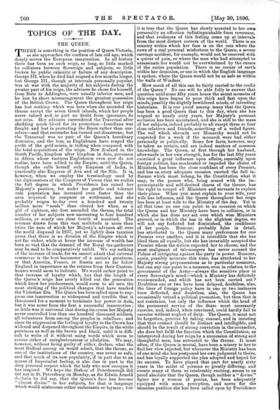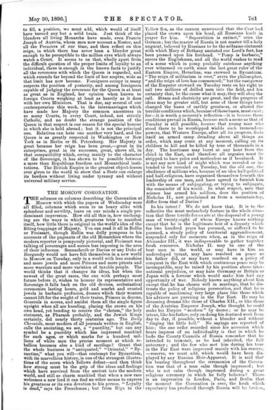TOPICS OF THE DAY.
THE QUEEN.
THERE is something in the position of Queen Victoria, as she approaches the confines of late old age, which deeply moves the European imagination. In all history there has been no such reign, so long, so little marked by collisions between Sovereign and subjects, so little broken by public calamity or failure of any description. George III, when he died had reigned a few months longer, but George III., though at intervals personally popular, was at war with the majority of his subjects during the greater part of his reign, the advisers he chose for himself, from Bute to Addington, were usually inferior men, and he lost by sheer mismanagement the greatest possession of the British Crown. The Queen throughout her reign has lost nothing which was hers when she ascended the throne except the seven Greek islands, which her people never valued and, in part no doubt from ignorance, do not miss. Her advisers surrendered the Transvaal after shedding much blood for its protection—Isandlana was fought and lost in protecting the Boers rather than our- selves—and that surrender has turned out disastrous ; but the Transvaal was no part of the Queen's hereditary dominion, and the loss, as Englishmen have reaped the profit of the gold-mines, is trifling when compared with the total acquisitions of the reign. New Zealand in the South Pacific, kingdom after kingdom in Asia, provinces in Africa whose vastness Englishmen even now do not realise, have been added to the Empire, until the Queen, though she calls herself only Empress of India, is practically also Empress of Ave and of the Nile. It is, however, when we employ the terminology used by the diplomatists at the Congress of Vienna that we realise the full degree in which Providence has raised her Majesty's position, for under her gentle and tolerant rule population has increased even faster than the area acquired by conquest or settlement, and she probably reigns to-day over a hundred and twenty million more " souls " than obeyed her when, as a girl of eighteen, she first ascended the throne, the total number of her subjects now amounting to four hundred millions, or nearly one clear fourth of mankind. The revenue drawn from this vast multitude is more than twice the sum of which her Majesty's advisers all over the world disposed in 1837, yet so lightly does taxation press that there is no division of the Empire which is not far richer, while at home the increase of wealth has been so vast that the demand of the Royal tax-gatherers may be said to be comparatively unfelt. We say nothing of the increase of trade, for we cannot admit that external commerce is the best barometer of a nation's greatness, or that America, France, or Russia are so far below England in importance as the returns from their Custom- houses would seem to indicate. We would rather point to that increase of loyalty which, but that the length of the Queen's reign has nearly killed out the generation which knew her predecessors, would seem to all men the most striking of the political changes that have marked the Victorian Era. The Queen has been called upon to sup- press one insurrection so widespread and terrible that it threatened for a moment to terminate her power in Asia, but it was never from the first a successful insurrection ; so little was it universal that during its course her Majesty never controlled less than one hundred thousand soldiers, all volunteers from among the peoples in rebellion ; and since its suppression the feeling of loyalty to the Crown has widened and deepened throughout the Empire, in the white provinces as well as the brown and black, until it is diffi- cult to write of it without using words which seem to savour either of vaingloriousness or adulation. We may, however, without being guilty of either, declare, what the most Radical among us would admit, that the throne, as one of the institutions of the country, was never so safe, and that much of its new popularity, if in part due to an access of Imperialist feeling, is also due in part to the deep personal respect which the lady who now occupies it has inspired. We hope the Bishop of Peterborough did not say in St. Petersburg on Monday, as Sir Edwin Arnold declares he did say, that the Queen's face has become "almost divine" to her subjects, for that is language which would misbecome either ecclesiastic or layman ; but it is true that the Queen has slowly atereted to her own personality an affection indistinguishable from reverence,. and that evidences of this feeling come up at intervals from the most distant corners of the world. There is no country within which her face is on the coin where the news of a real personal misfortune to the Queen, a severe carriage accident, for example, would not be received with a quiver of pain, or where the man who had attempted to assassinate her would not be overwhelmed by the curses of the entire population. There is no corner of earth within her dominion, or one in which the English language is spoken, where the Queen would not be as safe as within the walls of Windsor.
How much of all this can be fairly carried to the credit of the Queen ? No one will be able fully to answer that question until some fifty years hence the secret memoirs of this reign have begun to pour thick and fast upon the minds, possibly the slightly bewildered minds, of intending historians. It is one proof among many that the Queen has been a good Queen that to this day, when she has reigned so nearly sixty years, her Majesty's personal seclusion has been maintained, and she is still to the mass. of her subjects, indeed probably to all except three or four close relatives and friends, something of a veiled figure. The veil which shrouds our Monarchy would not be respected for a week if the monarch were bad either personally or politically. Some few facts, however. may be taken as certain, and are indeed matters of common knowledge. The Queen, at first through her husband, afterwards in her own strength, has for the last fifty years exercised a great influence upon affairs especially upon foreign politics, has accelerated or impeded the choice of Ministers, has been the close confidant of every Premier, and. has on every adequate occasion exerted the full in- fluence which must belong, be the Constitution what it may, to the person who, being armed with the im- prescriptable and self-derived charm of the throne, has the right to compel all Ministers and servants to explain their plans. When you must explain to your wife, your wife has influence, and the Queen throughout her reign has been at least wife to the Ministry of the day. Yet in all that time no one can point to an occasion on which the Queen and her Ministry have been in collision, or in which she has done any act over which wise Ministers grieved, or in which she has in the slightest degree, we will not say forfeited but diminished, the confidence of her people. Rumour, probably false in detail, has attributed to the Queen many preferences for one Premier over another, and it is incredible that she has liked them all equally, but she has invariably accepted the Premier whom the nation expected her to choose, and the most malignant of talemongers has never accused the Palace of intriguing against the party in power. Rumour, again, possibly accurate this time has attributed to her Majesty strong prepossessions as time, particular measures, but can any one point to a measure, even in relation to the government of the Army—always the sensitive place in every Sovereign's mind—which a Ministry has definitely recommended, and which has not been carried out ? Doubtless one or two have been delayed, doubtless also, the lines of foreign policy have in one or two instances been deflected, and doubtless, also, the Queen has occasionally vetoed a political promotion, but then that is not resistance, but only the influence which the head of the permanent service of the State must necessarily exercise, and, indeed, when convinced, could hardly fail to exercise without neglect of duty. The Queen, it must not be forgotten, governs by taking counsel, and in insisting that that counsel should be distinct and intelligible, and should be the result of strong conviction in the counsellor, she does but fulfil the function which the Constitution, as interpreted during her reign by a succession of strong and thoughtful men, has entrusted to the throne. It must often, if the Queen is mortal, have been a misery to her to find her view rejected, but whenever the Ministry has been of one mind she has postponed her own judgment to theirs, and has loyally supported the plan adopted and hoped for its success. To have played that part for nearly sixty years in the midst of persons so greatly differing, and events many of them so intolerably exciting, seems to us proof absolute that the Queen, though neither a "divine" figure nor a woman of genius, has been adequately equipped with sense, perception, and nerve for the immense position she has been called upon by Providence to fill, a, position, we must add, which would of itself have turned any but a, solid brain. Just think of the blunders all living Monarchs have made, even Francis Joseph of Austria, whom men now account a Nestor, and all the Premiers of our time, and then reflect on this reign, in which there has never been a blunder great enough to be perceptible to the million eyes which always watch a Court. It seems to us that, wholly apart from the difficult question of the proper limits of loyalty to an individual, there is enough in the known facts to justify all the reverence with which the Queen is regarded, and which extends far beyond the limit of her sceptre, wide as that limit has now become. Foreigners occupy in many respects the position of posterity, and among foreigners capable of judging the reverence for the Queen is at least as great as in England, her opinion when known to foreign Courts weighing at least as heavily as it does with her own Ministers. That is due, say several of our contemporaries this week, to the intermarriages which have made her Majesty the common ancestress in so many Courts, in every Court, indeed, not strictly Catholic, and no doubt the strange position of the Queen in that respect is one reason for the special honour in which she is held abroad ; but it is not the principal one. Relatives can hate one another very hard, and the Queen is as greatly respected in Washington or New York as in Berlin or St. Petersburg. Her Majesty is great because her reign has been great,—great in its enterprises, great in its successes, great, above all, in that compatibility which, owing mainly to the character of the Sovereign, it has shown to be possible between a more than Republican freedom and Monarchical insti- tutions. The British Empire is the greatest object-lesson ever given to the world to show that a State can enlarge its borders without living under tyranny and without universal military service.



































 Previous page
Previous page